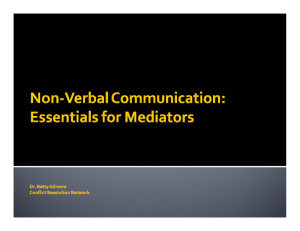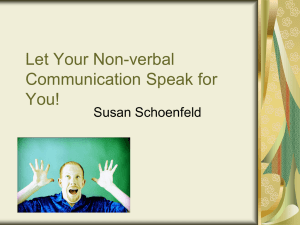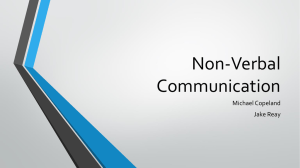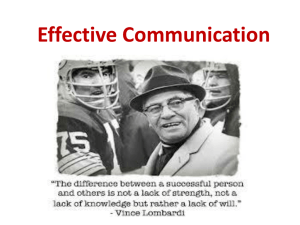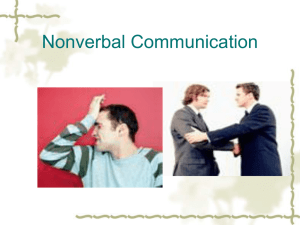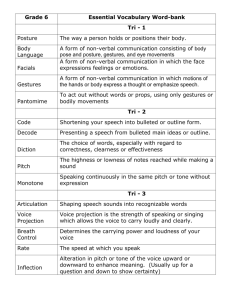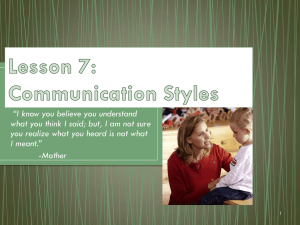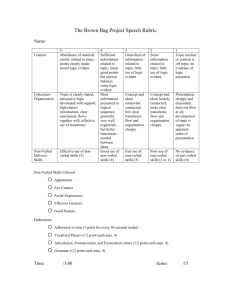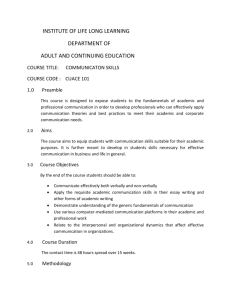communication nonverbal
advertisement
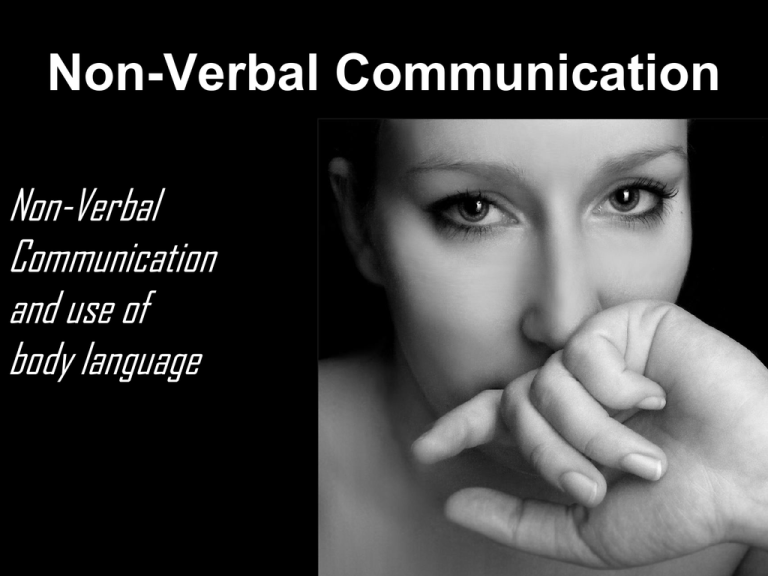
Non-Verbal Communication Non-Verbal Communication and use of body language Communication in general is the process of sending and receiving messages that enables humans to share knowledge, attitudes, and skills. Although we usually identify communication with speech, communication is composed of two dimensions: verbal and nonverbal. Non-verbal communication includes facial expressions, eye contact, tone of voice, body posture and motions, and positioning within groups. It may also include the way we wear our clothes or the silence we keep. BODILY SPEAKING… According to the social anthropologist, Edward T. Hall, in a normal conversation between two persons, less than 35% of social meaning is actually transmitted by words. So at least 65% of it is conveyed through the body (non-verbal channel). Have you ever heard anyone say, "His actions spoke so loudly I couldn't hear what he said?" Physical Aspects of Non Verbal communication • Kinesics (body language) Body motions such as shrugs, foot tapping, drumming fingers, eye movements such as winking, facial expressions, and gestures • Proxemics (proximity) Use of space to signal privacy or attraction • Haptics Touch • Oculesics Eye contact • Chronemics Use of time, waiting, pausing • Olfactics Smell • Vocalics Tone of voice, timbre, (expression) volume, speed • Sound symbols Grunting, mmm, er, ah, uh-huh, mumbling • Silence Pausing, waiting, secrecy • Posture Position of the body, stance • Adornment Clothing, jewellery, hairstyle • Locomotion Walking, running, staggering, limping Types of Physical Non-Verbal Communication • Illustrator – action that accompanies speech to add emphasis or additional info Types of Physical Non-Verbal Communication • Facial Expressions/Affec t Display – Face is the index of Mind – The eyes, the lips and the muscles express many feelings – It can also be purposefully deceiving Types of Physical Nonverbal Communication • Adaptors – Manipulating of self and objects in order to help you adapt and feel better about your environment Types of Physical Non-Verbal Communication • Regulators – nonverbal cues we provide during conversation to keep the flow REGULATED Types of Physical Non-Verbal Communication Signs/Emblems Use of various signs in non verbal communication used in place of words The Eyes • Stare or fixed gaze suggest involvement or wonder or anger or disapproval. • Raised looks show dominance or surprise. • Downcast looks suggest weakness and submission • Direct eye contact communicates honesty, transparency and neutral attitude. Gestures and Postures Positive Gestures • • • • Open Palms Eye-to-eye confrontation Smile Equal Handshake Postures • Standing position • Walking style • Hand Movements • Symbolic Non-Verbal: This is the type of communication that makes use of religious, status, or ego-building symbols. • Aesthetic Non-Verbal: This is the type of communication that takes place through creative expressions: playing instrumental music, dancing, painting and sculpturing. NONVERBAL BEHAVIOR Brisk, erect walk INTERPRETATION Confidence Standing with hands on Readiness, aggression hips Sitting with legs crossed, foot kicking slightly Boredom Sitting, legs apart Open, relaxed Arms crossed on chest Defensiveness Walking with hands in pockets, shoulders hunched Dejection NONVERBAL BEHAVIOR INTERPRETATION Hand to cheek Evaluation, thinking Touching, slightly rubbing nose Rejection, doubt, lying Rubbing the eye Doubt, disbelief Hands clasped behind back Anger, frustration, apprehension Locked ankles Apprehension Head resting in hand, eyes downcast Boredom Rubbing hands Anticipation A Small Class Exercise So What Does This Mean? So What Does This Mean? • Let me see! • Authoritative • Pondering • Thinking • Considering So What Does This Mean? So What Does This Mean? • Can I help! • Trust me! • You’re in good hands! • Helping Hand So What Does This Mean? So What Does This Mean? • Dejected • Disappointed • Lost it. So What Does This Mean? So What Does This Mean? • Now just stop that! • Get out of here! • Defensive • Oppositional So What Does This Mean? So What Does This Mean? • So tell me more! • Open • Accepting • Welcoming Conclusion • Importance • confidence-building • expressions and gestures • awareness of nonverbal cues • avoiding misunderstandings •Suhas Patel •Yogesh Patade •Deepak Agarwal •Abhijeet Kale •Deepak Patil http://www.slideshare.net/deepakagarwal7/non-verbalcommunication-and-use-of-body-language-presentation GROUP MEMBERS Reference Material • Business Communication Asha Kaul • Effective Business Communication Francis soundararaj • Communication Skills Dr. Nageshwar Rao. Dr. Rajendra P.Das

